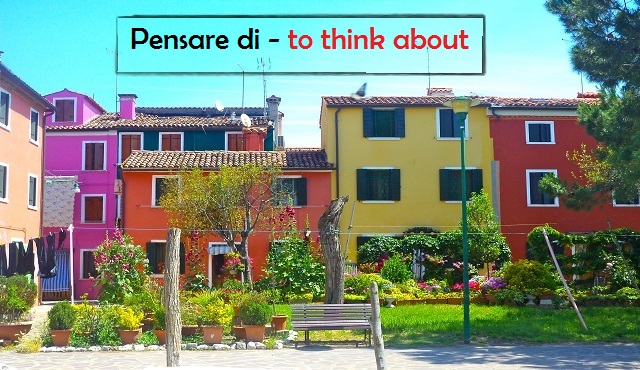When an Italian wants to describe what he is thinking about, he must use the verb pensare, and this is the verb that will be the topic of our blog today.
Pensare works a bit differently from the “typical” Italian verb with an -are ending.
- When using the verb pensare to express a thought one person or a group has for themselves, pensare must be followed by the prepositions “di” or “a.”
- “Pensare di” is used when the phrase to follow starts with a verb, which will be in the infinitive form (to see, to start, etc.).
- “Pensare a” is used when the phrase to follow describes a thought about someone or something.
|
Sperare + di + infinitive verb |
So, “I think…” would be ” Io penso di…” or ” Io penso a…” But of course, we leave out the subject pronoun in Italian, so the phrases become: “Penso di…” or “Penso a…”
“We think… “ would be: “Pensiamo di…” or “Pensiamo a…”
Or, one can just say, “Pensiamo!” for “Let’s think!” in order to encourage an entire group to think about a certain topic.
Listed in the table below are some every day phrases that use the verb pensare to express what we are thinking about. Notice that in each of these phrases the subject is expressing a thought he or the group has for themselves.
Simply memorize the first phrase, “Penso di si,” as it is a common expression that will come in handy when agreeing with people. For the rest of the phrases below, it will be important to remember that the simple present tense in Italian can have many different meanings in English, such as: “I think,” “I am thinking,” “I do think,” and “I am going to think.” But for the Italian, simply use the phrases, “Penso di…” or “Penso a…”
In a similar way, when translating the Italian infinitive verb that describes an action you are thinking of, use the English present progressive tense (a verb with the “-ing”ending) to express the same idea.
Try out these sentences by saying them out loud. Add additional qualifiers at the end of the sentence when using these phrases to describe “when” you think something might occur if you like. There are, of course, many more “things” one can think about during the course of an ordinary day than we have listed below! How many more can you think of?
| Penso di “si.” | I think so. |
| Pensiamo! | Let’s think! |
| Penso a te. Penserò a lui per sempre. |
(I am) Thinking of you. I will always think of him. |
| Penso alla bella macchina rossa che tu hai ogni giorno. | I think of the beautiful red car that you have every day. |
| Penso di… viaggiare a Roma d’estate. | I am thinking of… traveling to Rome in the summer. |
| Pensiamo di… iniziare il progetto domani. | We are thinking of… starting the project tomorrow. |
As you may have noticed from the example sentences above, many different ideas can be linked to a phrase that starts with pensare. By learning to start phrases properly with pensare, we can build longer and more meaningful sentences in Italian and express complex thoughts. But we are not done yet! Because…
- When one uses the verb pensare to express a thought he has regarding someone else or something else, he must follow the verb with the conjunction “che,” which means “that.” In fact, the word “che” can never be left out of an Italian sentence of this type (which is not the case in English).
- “Che” will then be followed by a verb in the subjunctive mood, which will start the phrase that follows, in order to describe what the subject is thinking about.
|
Pensare + che + subjunctive present tense verb |
Just what is the subjunctive mood? The subjunctive mood is the type of verb form that Italians use to express a wide range of emotions: hopes (as we have reviewed in the Fra Noi blog from the November 2018), thoughts (as we are discussing now), beliefs, doubts, uncertainty, desire or a feeling. There is a long list of phrases that trigger the subjunctive mood, and many of these phrases will be the subject of later blogs.
For now, let’s review the commonly used present tense form of the subjunctive mood for the verb essere, which means “to be.”
Che is included in parentheses in the first column of our verb table below as a reminder that these verb forms are typically introduced with the conjunction che. Also, make sure to include the subject pronoun in your sentence after che for clarity, since the singular verb forms are identical.
Practice the subjunctive verbs out loud by saying che , the subject pronoun and then the correct verb form that follows.
Essere – to be – Present Subjunctive Mood
| (che) io | sia | I am |
| (che) tu | sia | you (familiar) are |
| (che) Lei (che) lei/lui |
sia | you (polite) are she/he is |
| (che) noi | siamo | we are |
| (che) voi | siate | you all are |
| (che) loro | siano | they are |
Example Phrases Using “Essere” in the Present Tense Subjunctive Mood
The verb essere (to be) is commonly used in the subjunctive mood when describing what we think about something or someone.
For instance, rather than simply stating a fact, if we are not sure, we may say, “I think…” this or that is true and then we will need to use the subjunctive mood!
Or, let’s say we went to see a movie, and want to describe what we think about the experience or the actors. Or, maybe we are talking with a friend and telling them what we think about a mutual friend or acquaintance. Then we must use the subjunctive mood in our sentence!
To follow are some examples of when the Italian subjunctive mood in the present tense might be used in conversation during daily life. Notice that the English translation is the same for the present tense examples and the Italian subjunctive mood examples used in the sentences below.
| Present Tense Phrase |
Present Tense Phrase with the Subjunctive Mood |
||
| Lei è bella. | She is beautiful. | Penso che lei sia bella. | I think that she is beautiful. |
| L’insegnante è simpatico. | The teacher is nice. | Penso che l’insegnante sia simpatico. | I think that the teacher is nice. |
| L’attrice è brava in quel film. | The actress is great in that film. | Penso che l’attrice sia brava in quel film.
|
I think that the actress is great in that film. |
| Il film è bello; ti piacerà. |
The film is good; you will like it. | Penso che il film sia bello; ti piacerà.
|
I think that the film is good; you will like it.* |
| Lei è contenta sulla scelta del vino per cena stasera. | She is happy with the choice of wine for dinner tonight. | Penso che lei sia contenta sulla scelta del vino per cena stasera.
|
I think that she is happy with the choice of wine for dinner tonight. |
| Loro sono bravi cantanti. | They are wonderful singers. | Penso che loro siano bravi cantanti. | I think that they are wonderful singers. |
| “Falstaff” è l’ultima opera che Verdi ha scritto. | “Falstaff” is the last opera that Verdi wrote. | Penso che “Falstaff” sia l’ultima opera che Puccini ha scritto.
|
I think that Falstaff is the last opera that Verdi wrote. |
| Lei è sposata. | She is married. | Penso che lei sia sposata. | I think that she is married. |
| Loro sono ricchi. | They are rich. | Penso che loro siano ricchi. | I think that they are rich. |
Remember how to link pensare to what you are thinking about and to the Italian subjunctive mood and I guarantee you will use this verb every day!
 Fra Noi Embrace Your Inner Italian
Fra Noi Embrace Your Inner Italian






